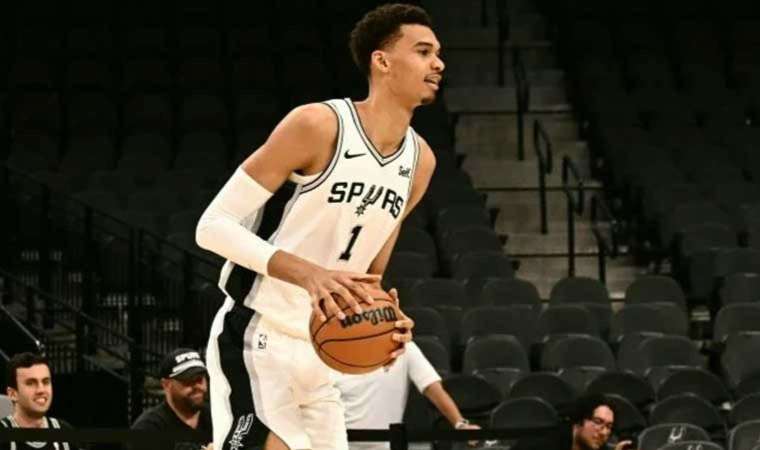In the fluid, ever-evolving landscape of professional basketball, where player movement has become as predictable as the changing seasons, a rare and cherished ambition occasionally surfaces: the desire to commit an entire career to a single franchise. Victor Wembanyama, the prodigious talent at the heart of the San Antonio Spurs` resurgence, has recently vocalized just such a dream, aiming to etch his name alongside the NBA`s most revered one-club legends. It’s a compelling notion, one that resonates deeply with fans longing for an era of unwavering loyalty, yet stands in stark contrast to the modern league`s transactional realities.
The Fading Ideal of the One-Franchise Player
Wembanyama`s declaration—”It`s obviously my dream to spend my entire career with a single franchise. Here. In San Antonio.”—comes from a place of youthful optimism and profound respect for the franchise that drafted him. This sentiment, while admirable, is increasingly uncommon. The NBA’s history books feature a select few who truly embodied this ideal: the stoic brilliance of Tim Duncan, the unwavering passion of Kobe Bryant, and the inimitable grace of Dirk Nowitzki. These titans, among a handful of others, spent their entire professional lives draped in one team`s colors, building legacies that transcended statistics.
However, their ranks are thin. In the contemporary NBA, player empowerment, the pursuit of super-teams, ever-escalating financial opportunities, and the brutal calculus of team management often conspire to make such singular devotion a romantic anachronism. Players once thought to be lifers find themselves traded in the dead of night, or choosing new pastures in free agency for a myriad of reasons – be it a better fit, a clearer path to a championship, or simply a more lucrative contract. The modern athlete, it seems, is a global citizen with options, not a serf bound to the land.
Why the Single-Team Dream is a Modern Gauntlet
The path to a one-franchise career is littered with potential pitfalls. For a player to remain with one team for fifteen-plus years, several highly improbable conditions must converge and persist:
- Sustained Team Success: No elite player wants to spend their prime years on a perpetually rebuilding or underperforming squad. A consistent contention window is paramount.
- Financial Alignment: Both player and team must agree on contract terms over multiple deals, often involving significant financial sacrifices or unprecedented payouts. Loyalty, unfortunately, rarely buys groceries.
- Coaching and Front Office Stability: Constant shifts in leadership can alter a team`s direction, potentially making a player a poor fit or a trade asset.
- Personal Goals vs. Team Trajectory: As a player ages, their role might change, or their championship window may narrow, prompting a move to a more immediate contender.
- Injury and Performance: An athlete`s body, or a dip in performance, can shift a team`s calculus from “untouchable cornerstone” to “valuable trade chip.”
It`s almost as if the universe itself conspires against simplicity in the pursuit of greatness.
San Antonio`s Strategic Blueprint for Longevity
Fortuitously for Wembanyama`s ambition, the San Antonio Spurs appear to be operating with an understanding of these very challenges. Their strategy around the French prodigy suggests a deliberate effort to create an environment where his dream could, against all odds, become reality. Rather than chasing every available veteran star, the Spurs have meticulously gathered young, high-potential talent that aligns with Wembanyama`s timeline and skillset. The arrivals of Dylan Harper, the No. 2 overall pick, and reigning Rookie of the Year Stephon Castle are not mere acquisitions; they are foundational pieces designed to complement Wembanyama`s unique abilities.
This patient, asset-rich approach – noticeably passing on opportunities for immediate, perhaps fleeting, star power – indicates a long-term vision. The Spurs aren`t just building a team for next season; they are cultivating a sustained ecosystem of talent, development, and championship aspiration. This calculated restraint, often misinterpreted as hesitation, is in fact a strategic investment in the very longevity Wembanyama desires. It’s a gamble that sustained internal growth will prove more valuable than opportunistic star chasing, especially if it cements the loyalty of their generational talent.
The Road Ahead: A Dream in the Making?
Victor Wembanyama, having recently been cleared for full basketball activities following a blood clot diagnosis, is poised to enter his third NBA season with heightened expectations. The core is forming, assets are stockpiled for future refinements, and the vision for a perennial contender is taking shape. If the Spurs can consistently contend for titles during Wembanyama`s prime years, and if his own performance continues its meteoric rise, then perhaps the seemingly impossible dream of a one-franchise career could materialize.
Yet, the journey is long, demanding, and fraught with variables. Wembanyama`s ambition is noble, a throwback to a cherished era of basketball identity. Whether he joins the exclusive club of single-team legends or succumbs to the modern league`s churn remains an open question, a fascinating narrative that will unfold with each passing season. One thing is certain: the Spurs, and indeed the entire NBA, will be watching closely as this unique quest for loyalty and legacy progresses.

